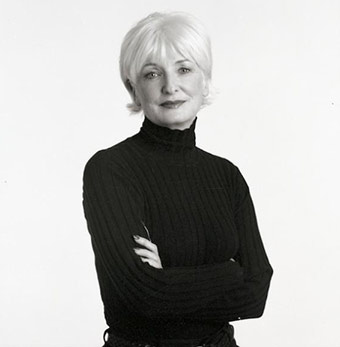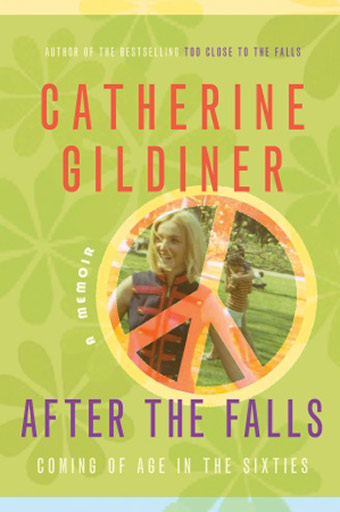Closer to the Falls
by Katherine O'Day


Author Cathy Gildiner talks about and signs copies of her new memoir
When Cathy Gildiner walked into the offices of Artvoice on a sunny day last summer, I immediately thought she was the most elegant person I’d ever seen come through that door (and Artvoice has been host to, among many others, Hillary Clinton, Louise Slaughter, Malachy McCourt, and the ever-dapper Carl Paladino). Dressed all in black and pulling a very nice set of luggage (she’d just come from the Canadian consulate), Gildiner has a silky swirl of platinum hair and the kind of alabaster skin found only on certain fair-complected women, her face bearing no trace of the acne she says plagued her throughout high school and college.
Born and raised in Lewiston and Amherst during the 1950s and 1960s, respectively, Catherine Gildiner nee McClure is the author of the best-selling memoir Too Close to the Falls and its just-published follow-up, After the Falls: Coming of Age in the Sixties. In the first book she chronicles her unusual upbringing as the only child of middle-aged parents, a memoir that ranks with Mary Karr’s The Liar’s Club and Jeannette Walls’s The Glass Castle; it’s that good.
And while Gildiner could still be considered a “local author” (she now resides in Toronto), and there is plenty of local interest in her books, she has achieved international praise on her own merits. With the long-awaited sequel just released and a third memoir in the works, she is becoming a bona fide literary star. She is also a licensed clinical psychotherapist who wrote her dissertation on the influence of Darwin on Freud, and the mother of three boys.
“I could make conversation with a doorknob,” Gildiner writes in After the Falls, describing her efforts during a painful sorority rush party her first year at Ohio University. Lucky for me, she is right. We sat down to talk at the picnic table in back of the Artvoice building. In town for her 45th high school reunion, Gildiner is, to paraphrase Rita Mae Brown, what one would call “still beautiful,” as opposed to “well-preserved.” She is starightforward, strident, self-assured, yet still soft somehow, warm and even a little bit maternal, despite her announcement that she has “the maternal instincts of this matchbook”—seizing a piece of evidence left behind by one of our unreformed staff member for effect. The mother of three young men in whom she takes obvious pride, this seems doubtful. Like her own mother, who not only didn’t prepare meals, she didn’t even keep food in the house, Gildiner insists she doesn’t cook and that she could never have raised her family without the help of her long-term nanny, whose miraculous appearance on the Gildiners’ doorstep one day was “almost, almost enough to make you believe in God.”
She looks, for the first and only time during our conversation, worried that she might have shocked me. She hasn’t.
After some conversation about the economic state of Buffalo and the northern downtown neighborhood in which we are situated, and which has apparently changed enormously for the better, we get to her career and her new book, which she will be promoting this week with at least three area appearances (see below).
Her path from private-practice pychoanalysis to best-selling memoirist includes one visible bridge, a work of fiction called Seduction which is only available in other countries at the moment. A murder mystery of sorts, it has not been distributed in the United States due to objections raised by someone who felt one of the characters was too strikingly similar to himself.
“It’s amazing to me that I’ve written two books about real people and no one has come forward, yet I write a work that is completely fictional, and someone has a problem.”
Well, as we’ve seen with certain other headline-grabbing works of “nonfiction,” suits for libel can come well after a book’s release. Gildiner mentions a scene in After the Falls where she and a friend are witness to a group of boys taking callous advantage of an arguably “willing” girl, and her concerns that some of those involved might take issue with her characterization of the event. While her upbringing doesn’t hold the tragic element of, say, The Liar’s Club or The Glass Castle, there are no shortage of dark moments from a priest’s inappropriate (and illegal) relationship with a young girl in the first book, to the above-mentioned scene, as well as a devastating romantic betrayal and some criminal political-activist intrigue in the second. Yet the thing about memory, as she points out, is that it can be faulty without being false.
“Memory is a tricky business. No two people remember things the same way. Memory is not a recording device; it is the brain’s way of allowing us to select moments in order to interpret out pasts. All of the images on file in our brains pass through elaborate screens of unconscious needs and emerge as memories. This book is my telling of my story as I remember it.”
—katherine o’day
Catherine Gildiner will appear on November 6, 2pm, at the Book Corner (1801 Main St., Niagara Falls); November 8, 7pm, at Talking Leaves Books (3158 Main St., Buffalo); November 9, 7pm, at Grand Island Memorial Library (1715 Bedell Rd., Grand Island); and November 10, 11:30am, at the Unitarian Universalist Church (corner of Elmwood and West Ferry, Buffalo). She will return for holiday book signings later this month and in early December. Visit www.gildiner.com for more information.
blog comments powered by Disqus|
Issue Navigation> Issue Index > v9n44 (Week of Thursday, November 4) > Closer to the Falls This Week's Issue • Artvoice Daily • Artvoice TV • Events Calendar • Classifieds |









 Current Issue
Current Issue